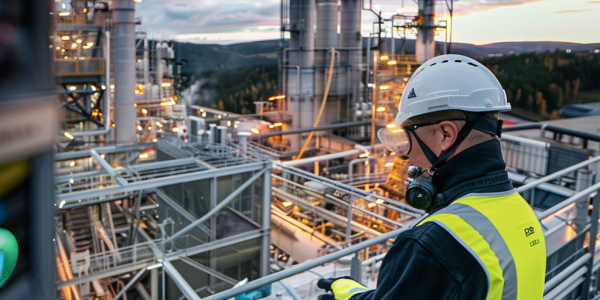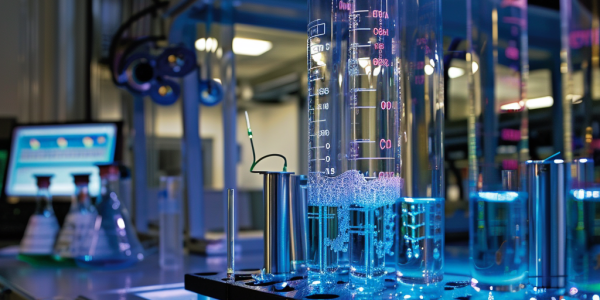Research Reveals Protective Role of CO₂ in Cellular Health
Recent research from the University of Utah reveals a surprising role for carbon dioxide (CO₂) in protecting cells from oxidative stress, a key factor in diseases like cancer and neurological disorders. The study shows that bicarbonate from dissolved CO₂ alters the Fenton reaction, reducing harmful DNA damage. This groundbreaking discovery highlights the potential therapeutic benefits of CO₂ in cellular health, challenging its negative perception in climate discussions.
Breakthrough Study Reveals Mechanisms of CO₂ Reduction Using Ni-N-C Catalysts
A groundbreaking study reveals how nickel and nitrogen co-doped carbon (Ni-N-C) catalysts can effectively convert carbon dioxide (CO₂) into carbon monoxide (CO), offering significant industrial applications for reducing greenhouse gas emissions. Led by the Max Planck Society, researchers employed advanced techniques to uncover the mechanisms behind CO₂ reduction, paving the way for innovative sustainable technologies that transform CO₂ into valuable resources.
KIST Develops Innovative Silver-Silica Catalyst for Enhanced CO₂ Reduction
A groundbreaking study from the Korea Institute of Science and Technology (KIST) reveals a novel silver-silica composite catalyst that enhances CO₂ reduction efficiency. Led by Dr. Hyung-Suk Oh and Dr. Woong Hee Lee, this innovative catalyst maintains nearly 100% selectivity even at high current densities, addressing challenges in carbon capture and utilization technologies. This advancement could revolutionize CO₂ utilization, making it more commercially viable and effective in combating climate change.
Alarming Decline in Natural Carbon Sinks Poses Threat to Climate Efforts
Recent studies reveal that natural ecosystems, crucial for absorbing carbon dioxide, have nearly stopped this process, raising concerns about climate change. The decline in carbon sinks, exacerbated by rising temperatures and extreme weather, threatens to accelerate global warming. With 2023 marking the highest CO2 emissions ever, the need for urgent climate action is critical to preserve and restore these vital ecosystems.
Innovative CSAR Technology Enhances Carbon Capture Efficiency
Researchers from SINTEF have unveiled the Continuous Swing Adsorption Reactor (CSAR), a groundbreaking carbon capture and storage (CCS) technology aimed at efficiently sequestering post-combustion CO2. With less energy consumption than traditional methods, CSAR promises to enhance sustainability in combating climate change. Successfully trialed at a waste combustion plant in Norway, this innovative system is set to revolutionize the CCS landscape, offering a cost-effective solution for industries looking to reduce their carbon footprint.
Discovery of ‘Chonkus’ Bacterium Offers Hope in Climate Change Fight
The discovery of a new bacterium, UTEX 3222, known as ‘Chonkus,’ offers hope in the fight against climate change. Found in volcanic ocean vents, this cyanobacterium shows exceptional capabilities for carbon dioxide absorption, making it a promising candidate for carbon capture technologies. Research highlights Chonkus’s potential to significantly reduce atmospheric CO2 levels, paving the way for innovative solutions in environmental science.
Rainfall Enhances Ocean’s Carbon Absorption by Up to 7%
A groundbreaking study reveals that rainfall significantly enhances the ocean’s ability to absorb carbon dioxide (CO2) by 5% to 7%, equating to an additional 140–190 million metric tons annually. Led by oceanographer David Ho, this research emphasizes the critical role of precipitation in the ocean’s carbon sink capacity and calls for a reevaluation of climate models to include rainfall effects on CO2 absorption.
New Research Reveals 31% Increase in Global Plant CO2 Uptake
Recent research published in Nature reveals that global plant carbon dioxide (CO2) uptake has increased by 31%, now estimated at 157 petagrams of carbon annually. This study highlights the critical role of terrestrial ecosystems in carbon sequestration and climate change mitigation, utilizing innovative tracking of carbonyl sulfide (OCS) to enhance understanding of photosynthesis. These findings could inform future climate models and policy decisions aimed at reducing greenhouse gas emissions.
University of Illinois Study Enhances CO2 Recycling Using Visible Light
A groundbreaking study from the University of Illinois reveals a novel method to enhance carbon dioxide recycling using visible light. This innovative research improves the efficiency and selectivity of electrochemical reduction, transforming CO2 into valuable hydrocarbons. Led by Professor Prashant Jain, the study showcases how integrating visible light with advanced electrodes can significantly accelerate chemical reactions, paving the way for sustainable energy solutions and reducing greenhouse gas emissions.
Ancient Log Discovery Offers New Hope for Climate Change Mitigation
A groundbreaking study reveals that a 3,375-year-old Eastern red cedar log has the potential to transform climate change strategies by showcasing the effectiveness of wood vaulting, a method that preserves carbon storage even after trees die. This discovery highlights the importance of innovative solutions in carbon sequestration and the need for reevaluating tree planting initiatives in the fight against climate change.










